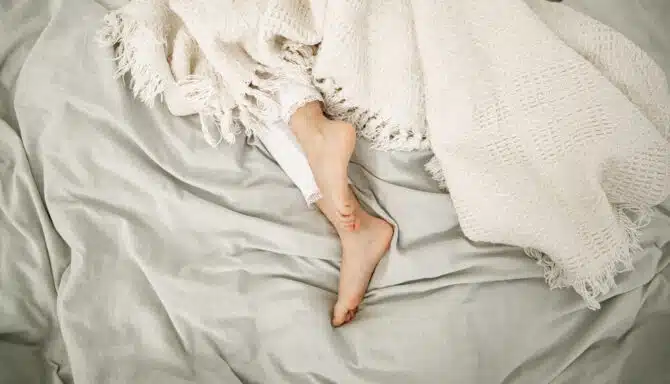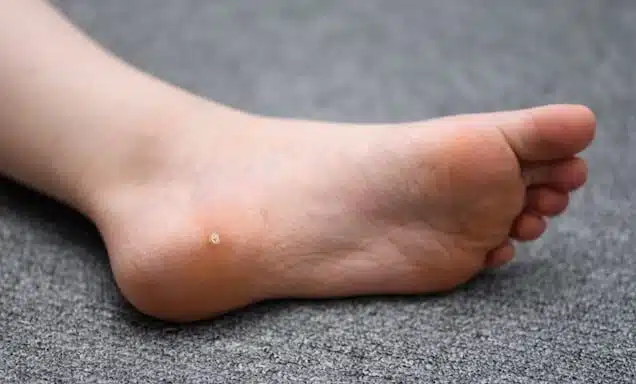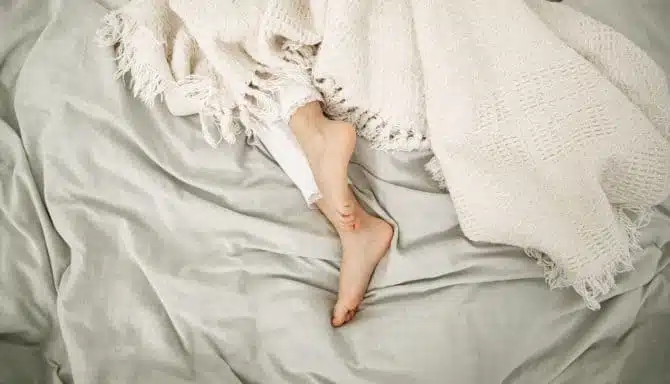January 23, 2025
There are plenty of myths about foot odor. From thinking it only happens in hot weather to assuming those who struggle with it must not bathe or shower, it’s a foot condition that can be difficult to understand and affect our confidence. You may also wonder if foot odor is a serious problem and when to see a foot specialist, like a podiatrist or chiropodist, about it. On the other hand, you may be able to tackle it on your own. Today we’ll talk in depth about when you might need some extra help with your foot odor.
What is Foot Odor?
https://www.youtube.com/watch?v=meO8VW1yxJ4
Foot odor is the unpleasant smell that arises from the feet. The main cause of foot odor is the excessive perspiration of the feet combining with bacteria, often occurring in areas where sweat accumulates the most, such as inside shoes or socks. This creates an ideal environment for bacteria to thrive.
Fun fact: human sweat itself is almost entirely odorless! Odors arise when it interacts with bacteria present on the skin, particularly on the soles and between the toes, forming odorous substances. This breakdown process produces an array of compounds, including acids, ammonia, and sulfur-based compounds, which are responsible for the characteristic smell.
Persistent Foot Odor Causes and How to Prevent Foot Odor
One condition that exacerbates foot odor is plantar hyperhidrosis, a condition where the sweat glands on the soles of the feet produce excessive amounts of sweat. When the feet sweat excessively, the increased moisture fosters a more conducive environment for the growth of bacteria, contributing to stronger foot odor.
This is a medical condition that often requires intervention to manage the excess sweating. Treatment options include topical antiperspirants, double layered cotton socks and Anticholinergic creams. A podiatrist or a chiropodist can also recommend absorbent insoles and give you advice on how to practice proper foot hygiene, which should include washing with an antibacterial soap, thoroughly drying, and applying foot powder or antifungal powder.
In addition to plantar hyperhidrosis, several other factors and health issues can contribute to foot odor:
Fungal Infections
Fungal infections, such as athlete's foot, thrive in warm, damp environments, which is why sweaty feet are more prone to infection. These infections can cause itching, burning, and peeling skin, alongside a musty odor due to the fungus feeding on skin cells.
Diabetes
Foot odor can be a serious concern for individuals with diabetes, as it might signal an infected wound or a diabetic ulcer, particularly in the toes or feet. Due to reduced circulation and nerve damage associated with diabetes, wounds can go unnoticed, and the risk of infection increases. The presence of odor may indicate that an infection is developing, which requires prompt medical attention to prevent complications such as cellulitis or gangrene.
Poor Circulation
Poor circulation can lead to excessive sweating as the body tries to regulate temperature. However, insufficient blood flow also prevents the proper removal of toxins, causing a build-up of bacteria that contributes to foot odor. It’s important to try and improve your circulation as much as possible: one way you can do so is with exercises that help with circulation in the winter time.
Hormonal Imbalances
Conditions such as pregnancy, menopause, or thyroid disorders can cause hormonal changes that influence sweat production. These fluctuations in hormones can trigger excessive sweating, creating an environment that supports bacterial growth and results in stronger foot odor.
Lifestyle and Diet
Poor foot hygiene or wearing shoes that do not allow the feet to breathe can trap moisture and heat, promoting bacterial growth that causes odor.
It’s important to wear breathable shoes to ensure excess moisture doesn’t build up and disrupt a healthy shoe environment. Moisture wicking socks are another great way to be vigilant against foot odor, in addition to regularly changing your socks throughout the day and keeping your feet nice and clean, which we discussed earlier.
Diets high in spicy foods, alcohol, or caffeine can also increase sweating and contribute to foot odor.
Is My Foot Odor A Serious Problem?
In general, foot odor is harmless and can be managed with good hygiene. But it can become a serious issue when it signals an underlying health problem, especially if it's persistent, worsens over time, or has a particularly foul smell that differs from the typical cheesy, vinegary or sweaty smells we all recognize in foot odor.
When combined with other symptoms such as redness, swelling, pain, or itching, it could indicate an infection like athlete's foot or cellulitis. If the odor is accompanied by open sores, blisters, peeling skin, or wounds that don't heal, it's important to pay attention to these signs as they may point to infections or worsening diabetic neuropathy that requires a prompt visit with a chiropodist or podiatrist. This is also crucial if your foot odour is accompanied by other concerning symptoms, such as a change in skin colour. Typically, it will be obvious if a pungent smell is radiating from a wound instead of just your feet, so in this case, treat the odor as an urgent matter.
When To See A Foot Specialist For Foot Odor
https://www.youtube.com/shorts/sBIdll7qylQ
If you’re unsure whether your foot odor is linked to a more severe issue, it’s a good idea to consult a healthcare professional for a thorough evaluation, and see a chiropodist at a foot clinic.
These experts can help identify the root cause of persistent odor, whether it’s fungal, bacterial, or linked to a medical condition like diabetes or plantar hyperhidrosis. They can also recommend effective options tailored to your specific needs, such as prescription topical solutions, high-quality creams and powders, advice on managing excess sweat, footwear recommendations, and more. Foot specialists are trained to spot subtle signs that might go unnoticed and can offer targeted solutions and tailored treatment plans that go beyond home remedies.
Seeing a foot specialist can also help you better manage foot odor linked to chronic conditions. For example, if you have diabetes or poor circulation, a chiropodist can advise you on preventative measures to avoid complications like infection or wound degradation. If you’re experiencing frequent or severe foot odor, don’t wait for it to escalate—getting professional help early can ensure that any underlying issues are addressed promptly and effectively.
November 30, 2024
Holiday shopping can feel like a daunting ordeal that takes away from all the fun. Your list is long, and you don't have ideas for some people - which is okay! But it doesn't have to cause so much stress. We've got you covered with our guide to the best foot care holiday gifts!
When you're stuck on what gift to get for your grandparents, friends, and other relatives, medical gifts may inspire you more than you realize. The health and wellness industry is known for producing excellent products, opening your mind to many gift options.
Gifts that promote foot health can help those with debilitating foot issues. But they can also help prevent foot conditions before they develop. And they're simply fun to use. We're talking foot creams, scrubs, and other luxurious products fit for a spa session!
The gifts we'll discuss today focus on both skincare and foot pain; they shine on their own and work well as stocking stuffers. But the best way to gift products from a foot care clinic is by compiling a foot care gift set! It's fun to try more than one product, and it gives loved ones the tools for a great self-care day. Let's take a look at our top picks!
Foot Care and Medical Gifts: Gift Guide 2024
Below is a general overview of our top foot care holiday gifts. But don't worry, we'll cover all the details.
Foot Exfoliators
Foot Creams & Moisturizers
Superfeet Insoles
Feet First Clinic Gift Certificates
Foot Exfoliators
Foot Scrubs & Foot Baths
Products like Gehwol's Herbal Bath are affordable medical gifts to raise your loved ones' foot care game to the next level. They're suitable for people of all ages and help exfoliate and soothe dry skin. Exfoliation prevents itchy, flaky dead skin from building up while simultaneously unclogging your pores. Exfoliating your feet weekly will help prevent and treat any callus buildup and cracked heels, while keeping your feet soft and moisturized.
But foot baths do even more for the body than you may realize. First, foot bath products combined with hot water help promote healthy blood flow, which can relieve pain from foot conditions like plantar fasciitis, bunions, etc. They can also warm your overall body temperature, which alleviates muscle tension, reduces stress, and may help prevent sickness or fight flu symptoms by strengthening your natural immunity (perfect for the winter!).
Helpful tip: It's best to start a spa session by bathing your feet, as it leaves a clean base for exfoliation and moisturizing by washing away bacteria and dirt.
Foot Files
Feet First Clinic's foot files are another great way to exfoliate your feet! You can gift someone a foot file as a stocking stuffer or as part of a gift box (throw in the Gehwol Herbal Foot Bath and some foot cream for the perfect foot care selection!).
But why do we need them?
Foot files remove hard, scaly dead skin from the bottom of the foot, making them feel silky smooth. Our foot files also have a smoothing side to buff and soften the skin. This allows you to customize and control where and how much skin you remove when exfoliating your feet (unlike the foot peels you see online). The perfect tool for concluding a luxurious at-home foot care session, you should give them some consideration as you shop for medical gifts.
View this post on Instagram
A post shared by Feet First Clinic (@feetfirstclinic_)
Foot Creams & Moisturizers
Gehwol Foot Creams
To restore the skin's natural barrier functions, you should always moisturize after soaking and exfoliating. Gehwol's Soft Feet Cream, Universal Foot Cream, and Med Lipidro Cream are just a few examples of medicinal moisturizers that work wonders. So why not gift them to someone you love? They'll get to enjoy smooth skin and fewer cracks and calluses.
If your loved one already has severely painful cracked heels, try gifting them Gehwol's Med Salve for Cracked Skin or Dermal Therapy Heel Care instead.
Dermal Therapy Heel Care
Hopefully, it's becoming clear that medical gifts can be more valuable than gifts that sit around collecting dust. And Dermal Therapy Heel Care is one of the best foot care holiday gifts around.
Cracked heels have the potential to burden everyone, from your best friend to your grandmother - dry skin doesn't discriminate! Severely cracked heels can make walking almost unbearable and cause swelling, inflammation, and bleeding. So if you're catching wind that someone you love is suffering, why not brighten their holidays by gifting them some relief?
Dermal Therapy helps skin cells deep below the surface absorb and lock in moisture, which fights cracked heels. It has the highest urea concentration (25%) of all the foot creams we carry. Urea is important because it works into the deeper layers of the skin to help skin both absorb and retain moisture. To top it off, dermal therapy is a moisturizer and exfoliator that removes dead cells, revealing fresh, young skin.
Superfeet Insoles
As far as medical gifts for healthy feet go, Superfeet insoles are a wonderful route to take. The general use of their most popular colour, green, is to provide extra support for people with flat feet, plantar fasciitis and other types of foot pain. And for those who want the same arch support as the flagship Superfeet Green, but with more cushioning and flexibility, you can get the Superfeet Run Cushion High Arch insoles - a new favourite and best seller at our Toronto foot clinic!
But if you have a loved one with more specific needs, worry not!
Superfeet produces several insoles with colours that indicate how they stand out. For example, Superfeet Berry is made specifically for women and comes with a slimmer heel and an arch length to fit the proportions of the female foot. And Superfeet Black is a versatile, low-profile option for people with flat feet. And that’s just the beginning!
November 7, 2024
Foot odor is a frustrating problem; it goes to show that non-painful foot conditions can be as life altering as painful ones. There are many foot odor myths floating around the internet. In this article, we'll break down some of the most common foot odor myths, and give you the facts about foot odor causes and how to prevent it.
6 Myths About Foot Odor:
Only People With Sweaty Feet Have Foot Odor
Foot Odor Always Means You Have a Serious Health Condition
All Foot Odor Smells the Same
Going Barefoot Helps Eliminate Odor
If You Have Foot Odor, you Aren’t Showering or Bathing
Foot Odor Only Happens in Hot Weather
Myth 1: Only People With Sweaty Feet Have Foot Odor
Foot odor, also known as bromodosis, is the unpleasant smell that comes from the feet due to a combination of sweat and bacteria. The feet have numerous sweat glands, which produce moisture to regulate temperature and prevent skin from drying out. Plantar hyperhidrosis is the medical term for excessively sweaty feet. Sweat is a major contributor to foot odor and provides the moisture needed for it to thrive, however, other factors are also at play.
The Main Causes of Foot Odor
General bacterial buildup and everyday life! (wearing shoes all day long, etc).
Fungal infections: Conditions like athlete’s foot can lead to odor as fungi produce waste products during growth.
Diet: Certain foods, like garlic and onions, can affect sweat composition and lead to a noticeable foot odor.
Health conditions: Conditions other than plantar hyperhidrosis can cause foot odor, including diabetes, particularly when ulcers and wounds omit a strong smell. Other conditions include thyroid disorders (they may cause excessive sweating) or kidney and liver issues.
Footwear material: Shoes made from non-breathable materials trap even normal sweat production, increasing moisture and bacterial growth. Preventing foot odor often means choosing breathable, waterproof shoes.
Hormonal changes: Puberty, pregnancy, or menopause can contribute to foot odor.
https://www.youtube.com/shorts/1aaNATnXvWw
Foot Odor Myth # 2: Foot Odor Always Means You Have a Serious Health Condition
It’s true that one of the causes of foot odor can be an underlying health condition, but that doesn't mean it's serious. The most common cause of foot odor is a general build up of sweat and bacteria that you can tackle yourself.
Foot odor is often caused by everyday factors like wearing shoes made from non-breathable materials or not changing socks frequently enough. In most cases, simple steps like improving hygiene, airing out shoes, or using foot deodorants (sprays, powders or creams) can help control the smell.
While it's important to be mindful of persistent odor or other accompanying symptoms, the vast majority of foot odor issues are easily managed with at-home care and do not indicate a serious health condition.
https://www.youtube.com/shorts/aFdZ042koME
Foot Odor Myth # 3: All Foot Odor Smells the Same
Foot odor can vary significantly based on several factors, including the underlying cause, personal hygiene, diet, and the type of bacteria or fungi present. For example, open wounds and sores will smell different than smelly, sweaty shoes. Here are some common smells:
Sour: Often caused by bacteria breaking down sweat, resulting in lactic acid production.
Musty: May be associated with fungal infections or warm, moist environments.
Vinegar-like: Often linked to sweat and potentially neglectful hygiene.
Ammonia: May indicate dehydration or a dietary imbalance.
Rotten: This odor can be a sign of a more serious infection.
Foot Odor Myth 4: Going Barefoot Helps Eliminate Odor
While going barefoot might seem like a good idea for reducing foot odor, it can actually have the opposite effect in some cases. While it’s always good to air out your feet, going barefoot outside exposes your feet to various surfaces that may harbour bacteria and fungi. Walking on dirty or damp surfaces can lead to the accumulation of these microorganisms, potentially worsening foot odor. In fact, foot fungus (one of the most common causes of foot odor) is often caused by walking barefoot in public places.
Additionally, sweat can still pool in the crevices of your feet without socks and shoes, allowing bacteria to thrive. Instead of eliminating odor, going barefoot may introduce new sources of smell. Wearing breathable footwear and moisture-wicking socks and changing them regularly is a much better idea.
Myth 5: If You Have Foot Odor, You Aren’t Showering or Bathing
This is completely untrue since foot odor is often linked to other conditions like plantar hyperhidrosis and fungal infections. Therefore, foot odor is is a symptom rather than a cause. It also often develops throughout the day, so you can shower every morning and still experience smelly feet when you get home at night.
That said, you should pay more attention to foot-specific hygiene and clean your feet frequently. Check out this blog article on foot hygiene tips to learn what to do.
Myth 6: Foot Odor Only Happens in Hot Weather
Foot odor is commonly associated with hot weather, but it can occur year-round, regardless of the temperature. While warm conditions can exacerbate sweating and create a breeding ground for bacteria, factors such as personal hygiene, footwear choice, and lifestyle also play significant roles in foot odor.
For example, wearing insulated shoes in fall or winter weather can trap moisture and heat, leading to odor even when temperatures are low. Additionally, individuals who sweat excessively—regardless of the season—are more likely to experience foot odor. Therefore, it’s essential to maintain proper foot care and hygiene practices throughout the year to prevent odor, not just during the warmer months.
https://youtube.com/shorts/meO8VW1yxJ4?si=EQb3gbihQ8E6-E0j
January 8, 2024
Here’s a scenario: you’re in a room with friends or family, and all of a sudden, you notice someone’s feet aren’t smelling too fresh. Could it be you? And if yes, what could be causing this? While foot odour can be an embarrassing revelation, you can tackle smelly feet by paying attention to your foot hygiene. And if your foot odour presents a more complex challenge, there are additional measures you can take to address the issue.
Causes of Smelly Feet
Most of the time, foot odour is the result of forgetting foot hygiene and keeping your feet cooped up in socks and shoes all day while working, exercising or walking for long periods. This will lead to a build up of sweat and bacteria.
This is actually good news, because it means you can take steps towards preventing foot odour without additional treatments. That said, in some cases, foot odour is more perplexing, and may be connected to the following conditions or risk factors:
Fungal infections like athlete’s foot. Bacteria can feed on the dry, flaky skin that accumulates, producing a pungent smell.
Plantar hyperhidrosis (excessive sweating). This is when your sweat glands produce more sweat than average.
Diabetes (festering foot ulcers may cause foot odour).
Risk factors like being overweight can cause you to sweat more than average. Additionally, eating a high-carb diet can exacerbate fungal and bacterial growth.
Lastly, the strength of the odour may be a sign of the cause. For example, the "typical foot odour smell" tends to be vinegar-like, sour, or smell slightly like stinky cheese. Foot fungus can be similar, but it may be much more pungent. Wound odour (like from a severe diabetic ulcer) can be more distinct and indescribable.
Remedies for Foot Odour
Let's be honest, it's unlikely that your feel will smell like a bouquet of roses 24/7 (although sometimes they will after a nice self-care session!). But what you can do is limit foot odour and prevent your feet from omitting a strong smell. Here are some of the better treatments:
Studies show that antimicrobial essential oils can fight smelly feet. Many hygienic foot products are made with antimicrobial agents.
Use foot deodorants, specifically from medicinal brands like Gehwol. They typically come in various forms, including sprays and powders, and they work by absorbing excess moisture on the feet and neutralizing odour, leaving your feet smelling and feeling fresh.
Try moisture wicking socks, and change your socks a couple of times during the day.
Wash your feet daily with soap and water, and don't ignore your feet while you shower.
Make sure your feet are perfectly dry (where safe around the home) after washing and before putting on socks and shoes, especially in between the toes. Bacteria often thrive in moist environments.
Wear breathable running shoes while exercising. Many shoes have uppers with perforated material that let fresh air in and out, promoting a healthy foot environment.
Replace the insoles of the running shoes
To prevent fungal nail infections that lead to unpleasant foot odour, attend regular medical pedicure treatments. These will keep your nails clean and properly trimmed.
If you have Diabetes, make sure you attend regular diabetic foot care appointments.
If your foot odour is caused by a fungal infection, you will need to treat it with the appropriate anti-fungal medicines (ointments, pills, etc). Keep in mind that if your foot odour is linked to a condition you should also make an appointment with a chiropodist to confirm the best treatment method.
March 9, 2023
Plantar warts and sports are an "iconic" duo of foot conditions and risk factors. Many athletes are looking for a quick fix for their plantar wart woes. But the truth is, switching your mindset towards prevention and medical foot care is just as important.
Let's look at our plantar wart guide for athletes and gym-goers! We'll answer some of your most pressing questions and dive into the following:
What are plantar warts?
Why are athletes prone to plantar warts?
Preventing plantar warts: foot hygiene and foot care
Prevention plantar warts: shoe choices
What are Plantar Warts?
Plantar warts are viral skin infections caused by the Human Papilloma Virus(HPV) that appear on the bottom of the feet.
Many people assume that HPV is solely a sexually transmitted infection, but there are over 200 strains, some causing warts and others causing cancer. People usually contract this virus strain by walking or running barefoot on an infected surface, which enters the skin via contact or through small cracks in the skin.
Warts appear round and look deceptively like corns, calluses and blisters. They result from the body's failure to fight off the HPV, which can sometimes disappear on its own depending on the strain. Symptoms and signs of plantar warts include:
A hard and "grainy" growth on the bottom of the foot, often on the ball of the foot or base of the toes
On dark skin, it may appear lighter than the surrounding skin
Calluses surrounding the wart if it has started to grow inward
"Wart seeds" - which look like a small black dot in the wart
Pain when walking or touching the wart
Mosaic warts or a cluster of warts
Treatment options from a foot clinic include cryotherapy and needling. You can read about treatments in more detail here.
Why are Athletes Prone to Plantar Warts?
Plantar warts have the potential to debilitate athletes and gym-goers and severely impact their physical progress. But why are the physically fit more likely to contract them in the first place?
HPV loves warm, moist environments. These include communal showers and locker rooms where sports teams typically congregate without shoes or socks. So without adequate foot protection, members of the same team can unknowingly pass on this troublesome skin infection to each other.
Competitive swimmers are also at risk since the walking area surrounding the swimming pools is also communal with heavy, barefoot traffic. Furthermore, the rough surfaces of pool decks may cause micro-trauma to the bottom of the feet, increasing the risk of viral contraction.
Athletes and fitness lovers are also more likely to experience hyperhidrosis, or excessive sweating of the feet, which can increase the risk. Athletes often also share infected gym equipment, such as mats, without thorough cleaning.
Photo by Anna Shvets from Pexels
Plantar Wart Prevention: Foot Hygiene and Foot Care
The best way to prevent plantar warts is to strictly monitor your foot health and keep your feet clean. If you already have plantar warts, these practices can help prevent the condition from worsening.
Here are some practices to abide by:
Follow a daily foot care routine, being careful not to miss days when you play sports or go to the gym. It should include cleaning, exfoliation, moisturizing, and more. Here is an excellent one to follow!
Lightly dust your feet with baby powder. This can also help with foot odour! You can also try Gehwol Foot Powder.
Wear moisture-wicking socks, foot pads or other protective products.
Never go barefoot in a communal area like a locker room, shower or pool deck. Always wear protective footwear like sandals or shower shoes while in these spaces.
Don't scratch or pick at any pre-existing plantar warts.
Air out your shoes after using them.
Always wash your hands if you touch one of your plantar warts.
Don't share shoes, socks, towels and other products with other people.
Plantar Wart Prevention: Shoe Choices
Athletes can't avoid keeping their feet cooped up in runners all day. What they can do, however, is make shoe choices that help to prevent the growth of plantar warts.
Shoes should be breathable and waterproof. You know how some runners have those mini holes in the upper that let air enter and escape? Those are the ones you should be on the hunt for! The ventilation keeps your foot environment fresh and healthy while you spend the day exerting energy. When shopping for shoes or attending a shoe fitting, stress the importance of finding shoes like these by asking for breathable options.
You can also look for shoes made with GORE-TEX fabric, which repels moisture while letting water vapour from sweat exit the shoe.
Looking For More Info on Plantar Warts?
We know that athletes are at risk of developing plantar warts, but did you know children are also vulnerable? If you're a concerned parent, check out this blog on managing plantar warts in children.
September 12, 2022
We've all heard the term cold feet to describe last-minute nerves. But cold and sweaty feet are a whole different ballgame.
Cold and sweaty feet can signal a common problem you can work on. Alternatively, it may indicate a more troubling medical condition that needs your attention. The most important thing to do is visit your family doctor or foot specialist when the problem becomes recurring.
Let's take a look at some causes of cold and sweaty feet and what you can do about them.
5 Common Causes of Cold and Sweaty Feet
Hyperhidrosis
Peripheral Arterial Disease (PAD)
Menopause
Overactive thyroid
Raynaud's disease
Hyperhidrosis
This is essentially a term for excessive sweating, which can simultaneously cause cold feet. Many people clue into this condition if they experience sweaty feet without exercising or being in the heat.
The Mayo Clinic state that Primary focal (essential) hyperhidrosis is the most common form and isn't a sign of an underlying medical condition. It occurs when the nerves in your body send too many signals to sweat glands. While embarrassing at times, it is certainly manageable. Secondary hyperhidrosis, on the other hand, is always associated with another medical condition.
Treatment
Foot deodorants, creams and sprays.
Antidepressants can lower triggers like stress and anxiety, which cause you to sweat more.
Nerve-blocking medications
Surgery
Daily foot hygiene practices: keeping feet clean and dry, regularly changing socks, etc.
Airing out your feet.
Breathable footwear.
Moisture-wicking and natural material socks.
Regular foot assessments to check for conditions that thrive in moist environments, like athlete's foot.
https://youtu.be/AlGson4tuYk?si=1M7H4jHFytugyVhB
Peripheral Arterial Disease (PAD)
PAD is a serious condition that affects the body's lower extremities. Due to fatty plaque buildup, the blood vessels that transport between the heart and the legs may become severely narrowed or blocked. It usually happens initially within the small blood vessels of the feet. Risk factors may include diabetes, being over 60 years of age and having high blood pressure and cholesterol.
Treatment
Sometimes the family doctor can prescribe medications called statins, which manage cholesterol and can be preventative.
Blood pressure medications.
Medications that increase blood flow in the legs.
Treating the underlying condition that could be causing the PAD
Stop smoking
Living a heart-healthy lifestyle, including a healthy diet and regular exercise.
Menopause
One of the most common culprits of cold and sweaty feet in older women is menopause. Due to hormonal imbalances, blood vessels expand and increase the level of blood flow in the body during this point in a woman's life, triggering night sweats. But hormonal changes can also slow blood circulation, quickly affecting the feet. Cold, sweaty feet can also contribute to insomnia in menopausal women.
Treatment
Estrogen therapy
Antidepressants
Eating a healthy diet that is low in sugar and salt.
Low-intensity exercise.
Monitoring stress levels.
Getting enough vitamin D.
Regular foot assessments to check for other symptoms, like foot swelling.
Overactive Thyroid
A thyroid disorder can cause plantar hyperhidrosis (excessive foot sweat) while also deregulating body temperature. An overactive thyroid also messes with our blood circulation, giving the feet and skin only a quarter of the blood supply they usually need. You should inquire with your family doctor about a thyroid condition if your feet are always cold and you've ruled out other causes.
Treatment
Medications
Surgical intervention.
The thyroid gland, courtesy of the National Cancer Institute
Raynaud's Disease
Raynaud's disease causes both cold hands and feet, as well as numb toes. Furthermore, Raynaud's can occur in its primary form or as an accompaniment to another disease, like lupus or Rheumatoid arthritis. Like many other cold feet causes, it decreases blood flow in certain body parts. This is due to blood vessels spasming in the affected areas- usually in response to the cold.
Treatment
Reducing the spasming of the blood vessels and knowing your triggers. If your trigger is cold then wearing warmer insulating socks/ gloves before the cooler weather has been found to be helpful
Calcium channel blockers can open the small blood vessels in the feet.
Wearing socks indoors.
Vasodilators, which relax blood vessels.
Severe cases may require surgery.
Additional Causes of Cold and Sweaty Feet
Anxiety disorders: Known to cause hyperhidrosis, severe stress and panic disorders can make you feel clammy and uncomfortable.
Exercise: An obvious cause of sweaty feet is regular physical activity. It's essential to keep on top of routine foot care if fitness is causing your sweaty feet.
Wearing small shoes: Sometimes sweat can't evaporate if our shoes don't fit properly.
Neuropathy: Nerve damage, common in diabetes patients, is known to cause excessive sweating and can disrupt regular body temperature






